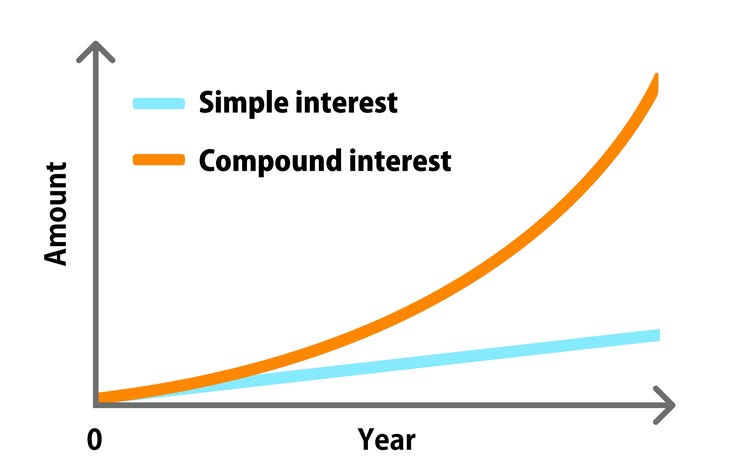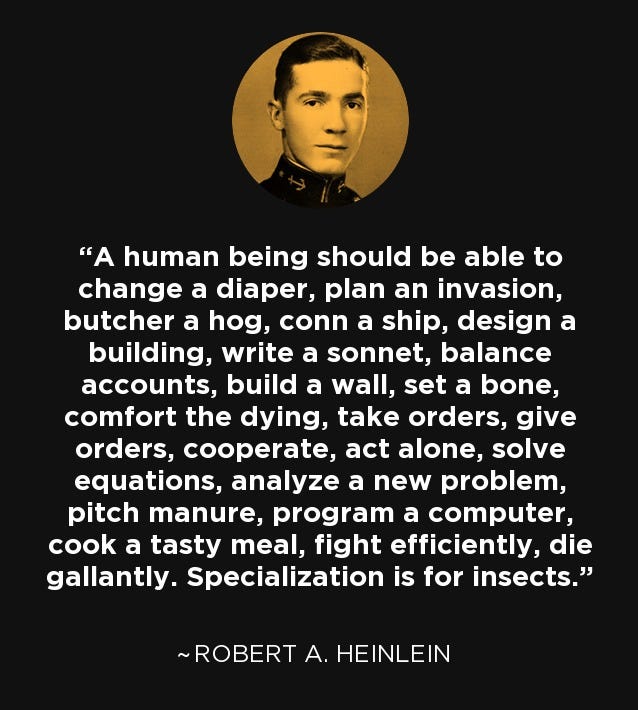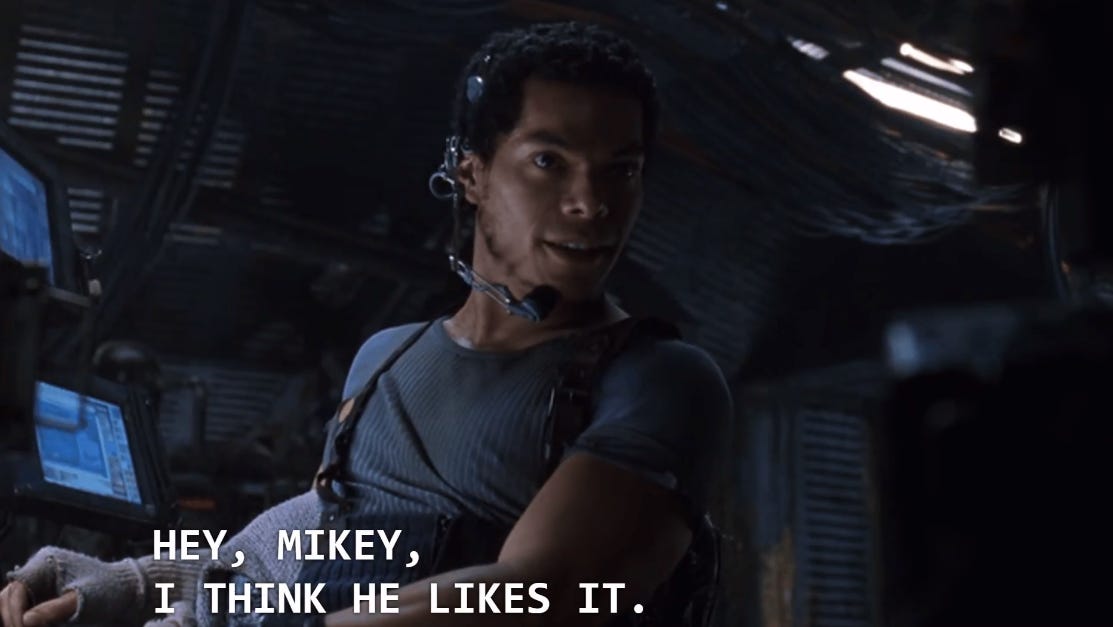Your life should be on an accelerated learning curve
Everyone knows compounding financials is powerful (yet still most don't do anything). Even more so is education, and thanks to the internet, this is free...
“An investment in knowledge pays the best interest.” —Benjamin Franklin
My friend Eric Friedman and I previously had a great discussion on the idea that throughout life, if you want to unlock the complete puzzle, you should be on an accelerated (compounding) learning curve. I’ve been thinking about this recently and realized why it’s such a powerful concept: it’s the opposite of how most people live.
Think about it – if you follow the normal path, you gain education in a structured setting while young and use that as the basis for a career. You continue to learn things, advance and grow – sure. But it’s growth as a byproduct of your experiences and fairly linear. That’s important too but by itself is not a consciously accelerated path. I believe an accelerated path is more than possible and the more diverse areas you explore the more interesting and valuable connections you’ll make.
A majority of individuals, whether in structured settings or during their careers, don’t consciously put themselves on an accelerated learning curve. I just don’t see it, and I didn’t do it either, at least at first - we’re just not told to do this. Some are lucky and find mentorship. Most of us are on our own. But an accelerated learning track is exactly what you should be on. Everything is more fun, fulfilling and meaningful this way.
To prime yourself for this, first you must realize something and heavily internalize it: you know nothing. This is mostly the opposite of what we’re conditioned for in educational institutions, where a big part of the credentialism of modern academia, consciously or not, is to instill a sense of superiority: at best so you’ve got some confidence but at worst (generally happens at ‘brand’ institutions) it breeds smugness.
Anyway, only when you realize you do know nothing is your mind ready for accelerated learning. When you live life thinking you have all the answers your mind is closed and unreceptive.
“The whole purpose of education is to turn mirrors into windows.” —Sydney J. Harris
Approaching situations with the mindset that you know nothing is powerful as you enter them objectively, not subjectively. Our egos are not in the way. And an objective, measured (first principles) mindset is necessary for learning. When you always bias first to a subjective mindset you have already lost most chances for learning (note: over time this can help train you when it’s appropriate to put your defenses up, this is important too, but a separate topic from today’s discussion).
Once you have realized this, you’re ready. Here are some specific next steps you could take to put yourself on an accelerated learning curve.
Quit your job…if
You are not given both creative and analytical projects
Your employer doesn’t allow you to engage in metacognitive exercises such as writing or speaking publicly about your industry and being part of the online discourse
You have totally mastered all areas of it
Your organization doesn’t have remarkable leaders you wouldn’t want to be like
You are a part of a process you have no say in shaping
Your employer doesn’t send you to events like industry conferences or pay for continued online learning
You’re not learning new skills/participating in new experiences monthly
You’re not solving problems that have never been solved
Overall, you need to be in a role that nurtures an accelerated learning curve, especially while young. An easy way to know this if you’re unsure is the following thought exercise: if you don’t think you’ve learned more in the last year than you have in the previous 3, it’s time for a new position. The whole idea of an accelerated learning curve is you cannot be stagnating. Who would want this anyway?
Remember, the real value of your job or even business you own is not about how much money you make (after needs are taken care of) but how much you learn. That is, if you care to be on an accelerated learning curve. I didn’t say this was for everyone (some people do just want more money, they’ll eventually learn why that’s silly, some on their death bed).
The reason this is listed first is your job is where you spend a majority of your time. If you don’t have a job inclusive of the above items and you have a desire to be on an accelerated learning curve, you have the wrong job.
Engage in independent learning
You need to not just be learning while at work or from others, you need to also be learning on your own. This is an opportunity to get out of your vertical and become exposed to others. Interesting results always happen at the intersection and again I can’t understate the importance of intersectionality. Read blogs, books and case studies on new areas. Explore the internet and libraries. Get books online and in local shops. Take MOOCs (Massive Open Online Courses). Listen to podcasts and watch vlogs on subjects you know nothing about. Read research reports. Don’t close yourself off to knowledge because it is in formats of media that are unfamiliar.
My approach to this is to have less structure/specific tactics and instead overall areas of focus. For example, I’m fascinated by sociology and psychology. And so I have a queue of books/blogs/studies/content I keep full that I dig into during free time. That’s pretty much the extent of my structure on this one, but I manage to get through the queue quick enough I’m regularly filling it back up. Your independent learning can be more structured if that works for you, I am probably weird here, but think the most important point is it’s a subject that’s pleasurable to you. That way you’re likely to fill free time with it. This is orders of magnitude more fun than TV, by the way.
An intake of knowledge without necessarily being required to do anything with it is powerful and allows you to reflect and contemplate versus apply. You mostly don’t get to do this in educational institutions and structured settings: in most areas of learning, there is always a “next step” with data or ideas you take in. But not all learning should necessarily be like this especially if nurturing cross-domain creativity is desired. Instead, this type of knowledge acquisition is part of a broader mix of tactics.
Connect with others both digitally and in person
Not only should you have a group of others you’re learning from/engaging with digitally, you need this in person/offline too. In Richard Florida’s book, Who’s Your City, the central theme is simple: the creative economy is making where to live the most important decision of your life. That’s because you need to be surrounded by others who motivate and push you to higher levels of success. Equally important, learning from others in 1-1 or small group situations presents opportunities far beyond that of larger classrooms. Developing these types of relationships is an integral step to being on an accelerated learning curve. Because of the advent of remote work, I promise you can find fascinating people to connect with anywhere, and it’s actually really easy to do (no one I’ve asked to meet for coffee since moving to Austin has said no).
You should make art
I’ve discussed the reasons behind this previously in the link above, but to put it simply: art is something that anyone can and should create. It is not limited to those who society deems creative. That’s a silly idea. We’re all innately creative, and all of us are potentially artists. It is not a unique skill set to individuals, it’s unique to our species. You either decide to nurture this ability or you don’t. And to exercise your mind in this way taps into an area that otherwise lays dormant. Creating art is actively learning.
Document your progress
And an easy way to do this is to write. It’s very possible to fit something like blogging into a busy life. Documenting thoughts/lessons learned/creative ideas in a physical, public format forces you to organize them and provides a future reference point. Essentially, this allows you to build on ideas as you move forward. Any other reasons for blogging aside, it’s in a sense like going to the gym for your brain. People who write well, think well.
Teach/mentor others
I’ve been doing this as an electronic musician for nearly 2 decades, and every time I give knowledge transfer to someone else, I find it helps my own growth too. It’s win-win – you help encourage someone new and concurrently you’re forced to articulate your processes, tips, tricks and strategies to someone else real-time. When you do this, it causes you to analyze and reflect on them in a different way than you normally do. In time, it helps you refine them.
Wrapping up…
This should be a fun exercise for you. If you don’t see at as this, there’s still more work to be done (and it’s probably the result of our institutionalized education system I am convinced makes it unfun to so many of us).
I personally wouldn’t return to school for additional learning. I’m unsure that structured learning — at least a structure defined by someone else was as effective for me as what I’ve outlined above for many reasons. Your mileage may vary of course, and the specific mix could be different for you. But it’s highly worth considering how you can put yourself on a path of continued, accelerated learning throughout life.






I've been reading 30-50 books a year for the past decade or so, and I'm starting to notice exponential rewards as I make new and interesting connections between disparate ideas. It gets me very excited for where I'll be in another decade.
You know what? You're damn right, especially about learning.